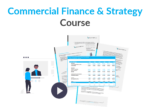
Beyond the Numbers: Top 5 Skills to Bridge the Gap from Accounting to Commercial Finance & Strategy
We’ve previously discussed the rewards of pursuing the career move from Accounting to Commercial Finance & Strategy in another post “challenges and opportunities when transitioning from accounting and audit to commercial finance and strategy”, but what are the critical skills accountants and auditors need to both secure AND excel in these roles?
You’ve meticulously reconciled accounts, ensured compliance with regulations, and mastered the intricacies of accounting standards. Your skillset as an accountant or auditor is invaluable. But whilst your understanding of debits and credits may be unquestionable, making the move from accounting and audit to commercial finance and strategy requires honing additional skills that extend beyond the traditional accounting toolkit.
Here, the focus isn’t solely on the rear-view mirror of financial history, but on using your financial expertise as a compass, navigating a company towards strategic growth and future prosperity. A 2024 report by McKinsey, “How finance skills are evolving in the era of artificial intelligence”, states Finance job postings show demand for traditional expertise falling in favour of interpersonal skills and ability to drive business impact.
Imagine yourself moving beyond the confines of historical reporting, and instead influencing everything from investment decisions to business operations. This shift from number crunching to strategic impact can be an exciting opportunity, but it requires a very specific skillset to thrive.
Below we delve into the 5 main skills you will need to master (and what they help you achieve), formulated from TheSwiftExit.com’s combined insights across 1000s of global client interactions, real-life experience in commercial roles, and collaboration with recruiters and commercial strategy experts.
1. Financial Modelling & Scenario Building: The Roadmap for Decisions
Financial modelling is the bedrock of business decision making. It involves building well-structured dynamic spreadsheets that forecast future financial performance under different scenarios. You’ll want to learn to incorporate various factors like market trends, economic conditions, and strategic initiatives to assess the financial implications of business decisions.
What’s the point? This skill allows you to:
- Evaluate the feasibility of new business ventures or product launches.
- Compare different investment options and assess the most attractive risk-return profile.
- Develop financial projections to support budgeting and resource allocation decisions.
2. Budgeting & Goal Setting: Transforming Aspirations into Actionable Plans
You’ll need to transition from passively recording financial activity of the past to actively shaping it through effective budgeting and goal setting. You’ll learn to develop realistic yet ambitious financial plans that align with the company’s overall strategy.
What’s the point? This skills allows you to:
- Collaborate with different departments to understand their needs and realistic resource requirements.
- Identify the underlying key performance indicators (KPIs) to track progress and measure success.
- Act as a filter for unrealistic stakeholder expectations / requirements.
- Monitor actual performance against budget (to report out to senior leadership) and make adjustments as needed.
3. Balancing Internal Capabilities and Opportunity Recognition:
In commercial finance and strategy, you’ll find yourself constantly walking a tight rope: a delicate balance of aspiration vs realism needs to be maintained. Whilst you may identify exciting business opportunities, you also need to assess your company’s internal capabilities, culture and readiness to pursue them.
What’s the point? This skill allows you to:
- Assess the company’s available resources, both financial and human capital.
- Evaluate the organization’s existing infrastructure and processes.
- Identify any potential gaps or limitations that may hinder the successful execution of an opportunity.
4. Assessing Investments & Business Cases:
In the realm of commercial finance and strategy, you’ll be responsible for evaluating potential investments and business cases, both organic (internal growth) and inorganic (through mergers and acquisitions).
What’s the point? This skill allows you to:
- Critically analyse financial data and market research to assess the potential risks and rewards of an investment.
- Develop risk mitigation strategies to address potential challenges and ensure project success.
- Provide your expert recommendations to key stakeholders based on the financial assessment you have crafted.
5. Syncing the team: Effective Communication & Business Partnering:
You’ll need to become a business partner, effectively communicating financial data to non-financial audiences and collaborating across departments to ensure the company objectives are achieved.
What’s the point? This skill allows you to:
- Translate complex financial information into clear and concise language that resonates with non-financial stakeholders.
- Tailor your communication style to different audiences, adapting to their level of financial understanding.
- Actively listen to and understanding the needs and priorities of other departments.
- Build strong relationships and foster collaboration to achieve shared goals.
Upskill for a Strategic Future: Bridging the Gap to Commercial Finance and Strategy
You deserve to go beyond mere number crunching.
The world of finance is evolving rapidly. While your strong foundation in accounting principles is valuable, the dynamic field of commercial finance and strategy demands that you build upon your skillset.
This shift requires existing accountants and auditors to upskill to both bridge the gap and thrive, particularly as the finance landscape is increasingly influenced by automation and AI. As AI handles the more mundane tasks, accountants and auditors need to focus on developing higher-order skills that computers cannot easily replicate.
Upskilling with a focus on the 5 critical skills we have covered is the answer.
- Financial Modelling & Scenario Building
- Budgeting & Goal Setting
- Balancing Internal Capabilities and Opportunity Recognition
- Assessing Investments & Business Cases
- Syncing: Effective Communication & Business Partnering
Upskilling is an ongoing journey, so embrace the continuous learning process and invest in your future.
But how do you get started?
This is where our “Commercial Finance & Strategy – Principles and Execution” online course comes in.
We developed the first and only course tailored specifically for early-career accountants and auditors, to help you gain 10+years of hard-earned on-the-job commercial expert knowledge in this one course. Efficiency, delivered.
It will equip you with the 5 critical skills we mention here, alongside all the essential knowledge and tools you need to secure AND excel in these coveted commercial finance and strategy roles.
“One of the most impressive finance team members in our startup portfolio”
– VC investor talking about one of our students
Through interactive modules, case studies, and real-world applications, you’ll learn how to confidently build financial models, assess business opportunities, and everything else needed to contribute meaningfully to strategic decision-making.
Build hard commercial skills to future-proof your skill set and prove you can translate your accounting background into a commercial context with the Commercial Finance & Strategy – Principles and Execution online course.
Exit Options | Mapping the post-accounting & audit landscape
A lot of the clients we coach ask about moving into more strategic & commercial roles after spending time in traditional accounting & audit, but don’t know where to start or even what opportunities exist …so-much-so that we’ve put together a map of the landscape of accounting exit opportunities, which I encourage you to check out!
Want personalised advice from one of our Co-Founders?
We’ve been where you are and can help you forge your swift exit. Click here to Get Coached.











